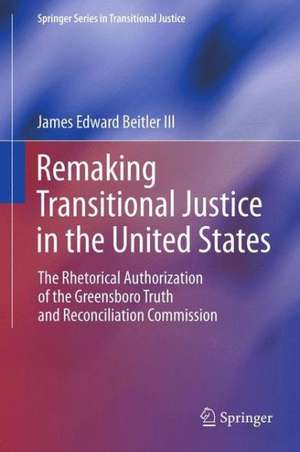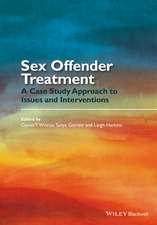Remaking Transitional Justice in the United States: The Rhetorical Authorization of the Greensboro Truth and Reconciliation Commission: Springer Series in Transitional Justice
Autor James Edward Beitler IIIen Limba Engleză Hardback – 10 noi 2012
| Toate formatele și edițiile | Preț | Express |
|---|---|---|
| Paperback (1) | 634.49 lei 6-8 săpt. | |
| Springer Us – 13 dec 2014 | 634.49 lei 6-8 săpt. | |
| Hardback (1) | 640.71 lei 6-8 săpt. | |
| Springer Us – 10 noi 2012 | 640.71 lei 6-8 săpt. |
Preț: 640.71 lei
Preț vechi: 753.77 lei
-15% Nou
Puncte Express: 961
Preț estimativ în valută:
122.61€ • 127.28$ • 102.24£
122.61€ • 127.28$ • 102.24£
Carte tipărită la comandă
Livrare economică 24 martie-07 aprilie
Preluare comenzi: 021 569.72.76
Specificații
ISBN-13: 9781461452942
ISBN-10: 1461452945
Pagini: 176
Ilustrații: XVIII, 158 p.
Dimensiuni: 155 x 235 x 15 mm
Greutate: 0.43 kg
Ediția:2013
Editura: Springer Us
Colecția Springer
Seria Springer Series in Transitional Justice
Locul publicării:New York, NY, United States
ISBN-10: 1461452945
Pagini: 176
Ilustrații: XVIII, 158 p.
Dimensiuni: 155 x 235 x 15 mm
Greutate: 0.43 kg
Ediția:2013
Editura: Springer Us
Colecția Springer
Seria Springer Series in Transitional Justice
Locul publicării:New York, NY, United States
Public țintă
ResearchCuprins
Chapter 1. The Problem of Power: Authorizing Transitional Justice in Greensboro, NorthCarolina.-Chapter 2. The Rhetorical Tradition of Transitional Justice.-Chapter 3: "A Person is a Person Through Other Persons": Reaccentuating Ubuntu in Greensboro.-Chapter 4. Reaccentuating Representivity in Greensboro.-Chapter 5. Redefining “Truth Commission”: Definitional Maneuvering in the Greensboro Truth and Reconciliation Commission’s Final Report.-Chapter 6. “Inescapable Networks of Mutuality”: The Development of Transitional Justicein the United States.
Notă biografică
James E. Beitler is an Assistant Professor of Writing Studies, Rhetoric, and Composition at Roger Williams University in Bristol, Rhode Island. His dissertation—which was completed at the University of Michigan in 2009—explores the rhetorical activity of the Greensboro Truth and Reconciliation Commission.
Textul de pe ultima copertă
Remaking Transitional Justice in the United States explores rhetorical attempts to authorize the Greensboro Truth and Reconciliation Commission—a grassroots initiative established in Greensboro, North Carolina in 2004 to investigate a traumatic and controversial event in the city’s past.
The book demonstrates that the field of transitional justice has given rise to a transnational rhetorical tradition that provides practitioners with resources to act in their own particular contexts. It then shows, through detailed analyses, how the Greensboro commissioners and their advocates made use of this rhetorical tradition in their attempts to establish the Commission’s authority in the community. Calling attention to the rhetorical moves shared among those working in the field of transitional justice, this study offers insights into the development of transitional justice in the United States and other liberal democracies.
This book is relevant to scholars and practitioners of transitional justice as it describes mechanisms of transitional justice that are frequently overlooked: rhetorical mechanisms. It also speaks to any readers interested in the communicative strategies of truth commissions.
The book demonstrates that the field of transitional justice has given rise to a transnational rhetorical tradition that provides practitioners with resources to act in their own particular contexts. It then shows, through detailed analyses, how the Greensboro commissioners and their advocates made use of this rhetorical tradition in their attempts to establish the Commission’s authority in the community. Calling attention to the rhetorical moves shared among those working in the field of transitional justice, this study offers insights into the development of transitional justice in the United States and other liberal democracies.
This book is relevant to scholars and practitioners of transitional justice as it describes mechanisms of transitional justice that are frequently overlooked: rhetorical mechanisms. It also speaks to any readers interested in the communicative strategies of truth commissions.
Caracteristici
Takes a language-oriented approach to the field of transitional justice Explores the first truth commission of its kind in the U.S. Serves as guide to practitioners of transitional justice who are looking for strategies to garner authority for their initiatives Reveals some of the global interconnections between various transitional justice initiatives.



















